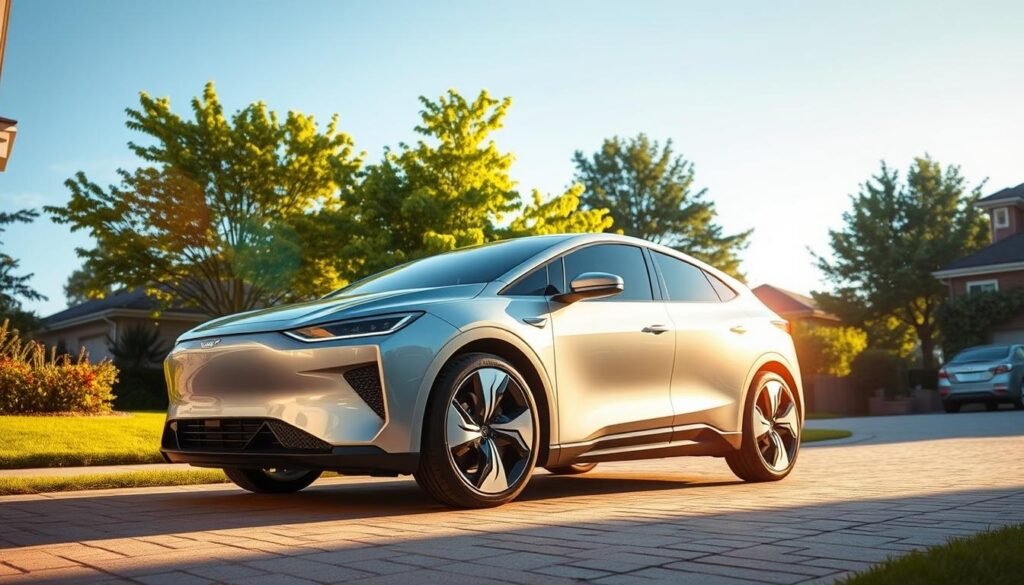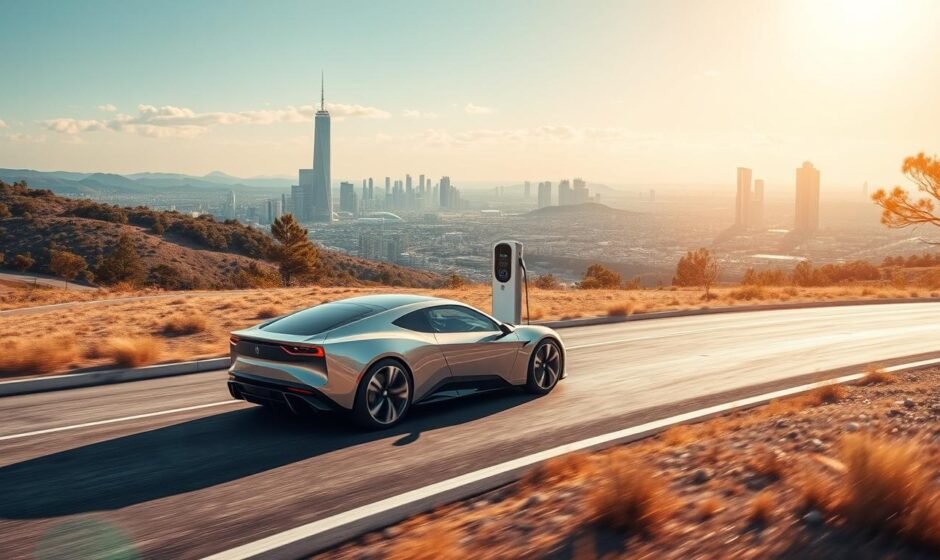Thinking about your next car? You might wonder about hydrogen fuel cell vehicles. Elon Musk said, “The stone age didn’t end because we ran out of stones, it ended because we found something better.” This is true for cars too, where hydrogen fuel cells are a green choice.
These cars can only make water vapor and go as far as regular cars. They’re great for those wanting to cut down on pollution. To learn more about hydrogen fuel cell vehicles benefits, and how they help our planet, click here.
Key Takeaways
- Hydrogen fuel cell vehicles offer a sustainable alternative to traditional combustion engine vehicles
- They emit only water vapor and have a similar range to traditional vehicles
- Hydrogen fuel cell vehicles have the ability to reduce greenhouse gas emissions and contribute to a cleaner energy future
- The advantages of hydrogen fuel cell vehicles include their environmental benefits and economic benefits
- As you consider your next vehicle purchase, hydrogen fuel cell vehicles are definitely worth considering for their hydrogen fuel cell vehicles benefits
- With 12 car manufacturers now making hydrogen fuel cell cars, you have many options to choose from
- Hydrogen fuel cell vehicles are set to be key in our shift to sustainable energy
Introduction to Hydrogen Fuel Cell Vehicles
When you think about hydrogen cars, it’s key to know how they work. These cars run on hydrogen, the most common element in the universe. They use hydrogen to make electricity, producing only water as waste. This makes them a great choice for those wanting environmentally friendly transport.
Choosing hydrogen fuel cell vehicles is smart because they refuel fast, like regular cars. You can fill up in just 3-5 minutes. They also go about 300-400 miles on one tank, perfect for long trips.
What Are Hydrogen Fuel Cell Vehicles?
Hydrogen fuel cell vehicles are electric cars that use a special cell to make electricity. They run on hydrogen stored in a tank and air oxygen. This mix creates electricity to power the car and water vapor as the only emission.
How Do They Work?
These cars are very efficient, using 40% to 60% of hydrogen to make electricity. This is much better than old cars. Their zero-emission feature and high efficiency make them a top choice for cleaner, more efficient travel.
Environmental Advantages of Hydrogen Fuel Cell Vehicles
When looking at hydrogen fuel cell vehicles, it’s key to see their environmental perks. They cut down on greenhouse gas emissions and our need for fossil fuels. Using hydrogen fuel cells in cars offers many benefits, like helping to clean up heavy industries.
Hydrogen fuel cells can be up to 65% efficient. This is way better than old power plants, which only get 33-35%. This high efficiency, along with hydrogen’s clean burn, means big cuts in emissions. Plus, hydrogen fuel cells don’t make greenhouse gases when they run, making the air cleaner.
Switching to hydrogen as a power source can also lower our fossil fuel use. This makes us less dependent on prices that can change a lot. About 50% of Americans live where air pollution is bad for health and the planet. Using hydrogen fuel cells can help make our air and environment cleaner and healthier.
Some main pluses of hydrogen fuel cell cars are:
- Zero emissions, leading to cleaner air and better health
- Less need for fossil fuels, making us less affected by price changes
- Higher efficiency, with the chance to reach up to 65%
Economic Benefits of Hydrogen Fuel Cell Vehicles
Looking into hydrogen fuel cell vehicles, we see their economic perks. They offer lower fuel costs over time. This is thanks to hydrogen fuel technology in vehicles, which cuts down on fossil fuel use and oil price swings.
There are also government incentives for these vehicles. Tax credits, grants, and other perks are available. These help balance out the higher initial cost of hydrogen fuel cell cars.
The main economic pluses of hydrogen fuel cell vehicles are:
- Lower operational costs due to reduced maintenance needs
- Potential for lower fuel costs over time
- Government incentives for adopting hydrogen fuel cell technology
Choosing hydrogen fuel cell vehicles supports a greener transport future. It also brings economic gains. With the pros of hydrogen fuel cell vehicles and the benefits of hydrogen fuel technology in vehicles, you help the planet and save money too.
Performance Features of Hydrogen Fuel Cell Vehicles
Thinking about switching to a hydrogen fuel cell vehicle? You might wonder about their performance. One big hydrogen fuel cell vehicles benefit is how fast they refuel. It’s as quick as filling up a gas tank, making them easy to use every day.
When it comes to how far they can go, hydrogen fuel cell vehicles are up there with diesel or gas cars. They can travel long distances without needing to stop for fuel often. This is great for road trips or long commutes.
Here are some key performance features of hydrogen fuel cell vehicles:
- Quick refueling times, similar to gasoline vehicles
- Impressive range, comparable to diesel or gasoline vehicles
- Zero tailpipe emissions, making them an environmentally friendly option
With their strong performance and hydrogen fuel cell vehicles benefits, it’s clear why many are choosing them. As technology improves, we’ll see even more advantages of hydrogen fuel cell vehicles in the future.
The Convenience of Hydrogen Fuel Cell Infrastructure
Thinking about hydrogen cars? The convenience of hydrogen fuel cell infrastructure is key. More hydrogen refueling stations are popping up. This makes owning and using hydrogen fuel cell vehicles easier.
With more stations, hydrogen fuel cell vehicles will be more accessible. They will be easier to use for more people.
Hydrogen fuel cell vehicles are easy to refuel. They work like traditional gasoline cars. You can drive over 300 miles on one tank of hydrogen. Refueling takes just a few minutes.
Some key benefits of hydrogen fuel cell infrastructure include:
- Easy integration with existing fuel systems
- Growing network of refueling stations
- Quick refueling times, comparable to traditional gasoline vehicles
In conclusion, the convenience of hydrogen fuel cell infrastructure is vital. As more refueling stations open, hydrogen fuel cell vehicles will become more practical. They will be easier for more people to use.
Hydrogen Fuel Cell Vehicles in Everyday Life
Thinking about hydrogen fuel cell vehicles in your daily life is key. They offer a long range and quick refueling, fitting well into your commute. The hydrogen fuel cell technology has many benefits, like zero emissions and less reliance on fossil fuels.
Hydrogen fuel cell vehicles have many perks. For instance, they can be refueled in about 5 minutes. A single tank of hydrogen can take you about 400 miles. Key benefits include:
- Zero emissions, making them eco-friendly
- Quick refueling times, like traditional gasoline vehicles
- Impressive range, great for daily drives and long trips
Imagine traveling long distances without worrying about fuel or pollution. Hydrogen fuel cell vehicles make this dream a reality. 
The initial cost of hydrogen fuel cell vehicles is higher than traditional cars. But, the benefits of using hydrogen fuel cell technology for vehicles like lower fuel costs and government incentives can help. As the tech improves and more cars are made, costs will likely drop, making these vehicles more accessible.
Safety Aspects of Hydrogen Fuel Cell Vehicles
Safety is a key benefit of hydrogen fuel cell vehicles. They come with advanced safety features to protect everyone inside. For example, the Toyota Mirai’s hydrogen tanks can handle pressures up to 225% of their normal 700 bar. This makes them safe in accidents.
Hydrogen fuel cell vehicles have many safety features. These include:
- Highly sensitive hydrogen sensors that detect leaks quickly and shut down valves instantly
- Temperature sensors that control hydrogen filling to prevent overheating
- A mechanical lock on the hydrogen dispenser nozzle to ensure safe refueling
Hydrogen is 14 times lighter than air, which helps it spread fast in leaks. This reduces the risk of fires. Tests have shown that igniting hydrogen creates a small flame, not a big explosion. You can find out more about hydrogen fuel cell vehicles and their safety at renewable energy resources.
Hydrogen Fuel Cell Vehicles vs. Battery Electric Vehicles
Choosing between hydrogen fuel cell vehicles and battery electric vehicles can be tough. Both have their advantages and downsides. Hydrogen fuel cell cars can go 400 to 600 miles on a single fill-up. They refuel in just 5 to 10 minutes.
Battery electric cars, on the other hand, can travel 150 to 375 miles before needing a charge. Charging them takes 4 to 8 hours. Recharging costs about $6 to $10, while hydrogen refills cost $75 to $125. For more on hydrogen fuel cell vehicles and sustainable living, check out Renewable Vibes.
Key Differences Explained
Here are some main differences between hydrogen fuel cell and battery electric vehicles:
- Driving range and refueling time
- Cost of ownership and maintenance
- Environmental impact and carbon emissions
Which is Right for You?
Choosing between hydrogen fuel cell and battery electric vehicles depends on your needs. Think about your daily drive, budget, and how green you want to be. Knowing the hydrogen fuel cell vehicles benefits and advantages of hydrogen fuel cell vehicles can help you decide.
Future of Hydrogen Fuel Cell Vehicles
Looking into the future of hydrogen cars is key. With new tech and more people choosing them, we’re moving towards cleaner transport. Hydrogen cars are set to grow in popularity, making our roads greener.
New tech is making hydrogen cars better and cheaper. Companies and governments are working together to build more hydrogen stations. This makes it easier for people to use hydrogen cars.
Toyota’s Mirai and Hyundai’s Nexo are leading the way in hydrogen cars. They show how cars can be both eco-friendly and powerful. Also, hydrogen buses and trains are starting to appear, showing hydrogen’s wide use.

The market for hydrogen cars is looking bright. Hydrogen could meet up to 35% of our energy needs, helping us use less fossil fuel. As tech improves and more people want them, hydrogen cars will become even more common.
The Role of Hydrogen Fuel Cells in Sustainability
When we talk about hydrogen fuel cells, it’s key to see how they help with renewable energy and a circular economy. They help us use less non-renewable energy and cut down on harm to the environment. This technology is a big step towards making our world more sustainable.
Hydrogen can be made from many sources, like renewable energy. This shows how it supports clean energy. Using hydrogen fuel cells in cars has many good points, like:
- Lowering greenhouse gas emissions and air pollution
- Using less fossil fuels
- Helping renewable energy
In short, hydrogen fuel cells are very important for our planet. They help us use clean energy and make our world more circular. Remember, using hydrogen fuel cells in cars has lots of benefits, like cutting emissions and supporting green energy.
How to Transition to a Hydrogen Fuel Cell Vehicle
Thinking about switching to a hydrogen fuel cell vehicle? It’s key to know the advantages of these cars. They can go up to 750 miles on a full tank and refuel in just 10 minutes. Plus, they don’t emit harmful emissions.
Switching to a hydrogen fuel cell vehicle involves a few steps. First, look into models like the Toyota Mirai, Honda Clarity, and Hyundai Nexo. Then, learn about the benefits of hydrogen fuel technology. Also, check out the growing number of hydrogen refueling stations. California has 52 open stations, with plans for 200 more by 2025.
Some important things to think about when switching include:
- Research available models and their features
- Understand the benefits of hydrogen fuel technology in vehicles
- Explore the growing network of hydrogen refueling stations
- Consider the pros of hydrogen fuel cell vehicles, including zero harmful emissions and long driving ranges
By following these steps, you can smoothly transition to a hydrogen fuel cell vehicle. You’ll enjoy the benefits of hydrogen fuel technology and help create a greener future.
Conclusion: Making the Move to Hydrogen Fuel Cell Vehicles
Hydrogen fuel cell vehicles are set to change the future of transport. They have a long range, quick refuelling, and no emissions. This makes them key in cutting down greenhouse gases and fighting climate change.
The transport sector is a big source of greenhouse gases in the US, making hydrogen fuel cells a vital choice. They help us move towards a greener future.
Are you ready to join the sustainable transport movement? Switching to a hydrogen fuel cell vehicle is a big step towards a cleaner transport system. These cars cut down your carbon footprint and offer great performance and convenience.
With more refuelling stations opening and tech improving, hydrogen fuel cell vehicles are looking brighter than ever. It’s time to embrace this future and make a difference.




